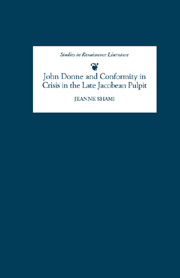Book contents
- Frontmatter
- Contents
- Dedication
- Acknowledgements
- Abbreviations
- 1 “Discreet or religious preachers”: John Donne and the late Jacobean Public Sphere
- 2 “The indiscretion of that foole”: John Knight and the Jacobean Pulpit, 1620–2
- 3 “The fishing of whales”: John Donne's Sermons, 1620–2
- 4 “Faire interpretation”: The Directions and the Crisis of Censorship
- 5 “Wise as Serpents, and innocent as Doves”: Zeal and Discretion in the Pulpit, 1623–5
- 6 “Jesus Wept”: The Journey to Spain and Pulpit Lamentation
- 7 “Blinde buzzards in the choise of a wife”: Sermons and the Moral Marketplace
- 8 “The Lovesick Spouse”: Parliament, Patriots, and the Public Sphere
- 9 “Church-quakes”: Post-Parliamentary Faultlines
- 10 “If the Foundations be Destroyed”: Rules of Engagement
- 11 “Blessed sobriety”: John Donne, the Public Sphere, and Caroline Conformity
- Works Cited
- General Index
- Index to John Donne References
- Index to John Donne's Sermons
- Studies in Renaissance Literature
3 - “The fishing of whales”: John Donne's Sermons, 1620–2
Published online by Cambridge University Press: 12 September 2012
- Frontmatter
- Contents
- Dedication
- Acknowledgements
- Abbreviations
- 1 “Discreet or religious preachers”: John Donne and the late Jacobean Public Sphere
- 2 “The indiscretion of that foole”: John Knight and the Jacobean Pulpit, 1620–2
- 3 “The fishing of whales”: John Donne's Sermons, 1620–2
- 4 “Faire interpretation”: The Directions and the Crisis of Censorship
- 5 “Wise as Serpents, and innocent as Doves”: Zeal and Discretion in the Pulpit, 1623–5
- 6 “Jesus Wept”: The Journey to Spain and Pulpit Lamentation
- 7 “Blinde buzzards in the choise of a wife”: Sermons and the Moral Marketplace
- 8 “The Lovesick Spouse”: Parliament, Patriots, and the Public Sphere
- 9 “Church-quakes”: Post-Parliamentary Faultlines
- 10 “If the Foundations be Destroyed”: Rules of Engagement
- 11 “Blessed sobriety”: John Donne, the Public Sphere, and Caroline Conformity
- Works Cited
- General Index
- Index to John Donne References
- Index to John Donne's Sermons
- Studies in Renaissance Literature
Summary
ALTHOUGH not published in his lifetime, a number of sermons preached by John Donne in the crucial period from 1620 to August 1622 have survived. These sermons span the period during which Donne was Reader at Lincoln's Inn, and after November 1621, Dean of St. Paul's Cathedral in London. They offer an important single case of the responses of a perceptive and complex preacher to the political climate registered in historical studies, and represented in the sermons already examined.Donne is a key figure for several reasons. It was Donne who was commissioned to defend James's Directions at Paul's Cross on 15 September 1622. There, the pressures wrought by censorship upon pulpit discourse are both inscribed and addressed. Donne's homiletic response to these restrictions is paradigmatic of the kinds of obedient counsel that could be practised in the pulpit. In it,Donne interrogates the boundaries of the public sphere and of his commitment to state institutions and authorities, and models for his hearers an actively engaged conformist identity. His sermons provide the most complex and most fully documented examples of such discreet conformity operating within the prevailing conditions of censorship and controversy. They reveal the fault lines within the English church, but, more important, they reveal the integrity of Donne's spirited religious imagination.
Donne's activities in 1620–2 after his return from the continent with the Doncaster embassy need to be reassessed in light of circumstances affecting preaching and controversial expression of any kind in the months leading up to the Directions.
- Type
- Chapter
- Information
- Publisher: Boydell & BrewerPrint publication year: 2003



